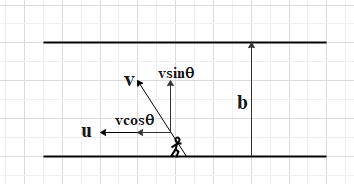Question
Question: A man who can swim at a velocity v relative to water wants to cross a river of width b flowing with ...
A man who can swim at a velocity v relative to water wants to cross a river of width b flowing with a speed u.
This question has multiple correct options.
A. the minimum time in which he can cross the river is vb
B. he can reach a point exactly opposite on the bank in time t=v2−u2b if v>u
C. he cannot reach the point exactly opposite on the bank if u>v
D. he cannot reach the point exactly opposite on the bank if v>u
Solution
Hint : We are given the relative velocity of the man with respect to the flow of water. Obtain the component of velocity of the man along the flow of water and in its perpendicular direction. Find the minimum time required using the velocity perpendicular to the flow of water.
Complete step by step solution :

A man is swimming in a river with velocity v relative to the river. Where the water flows with a speed u.
Let, the velocity v makes an angle of θ with the velocity of the river u.
So, the component of velocity of the swimming man in the direction of flow of water will be vcosθ and in the perpendicular direction of flow of water will be vsinθ .
Now, to cross the river in minimum time the component of velocity vsinθ should be maximum.
For vsinθ to be maximum, the sinθ should be maximum and for this θ=π/2
At θ=π/2, vsinθ will be v.
The width of the river is b.
So, the minimum time taken to cross the river will be,
tmin=vb
Again, to reach a point exactly opposite on the bank, net velocity of the man will be,
v2−u2 where, v>u
He cannot reach the exact opposite point if u>v
Hence, the time taken by the man to reach the point exactly opposite on the bank is,
t=v2−u2b
So, correct options are (A), (B) and (C)
Note : We can directly say that to cross the river to the point directly opposite to the bank, the velocity of swimming of the man should always be larger than the velocity of flow of water of the river. If the velocity of the flow of the river is larger than the velocity of the man, he can never reach the point directly opposite to the bank.
